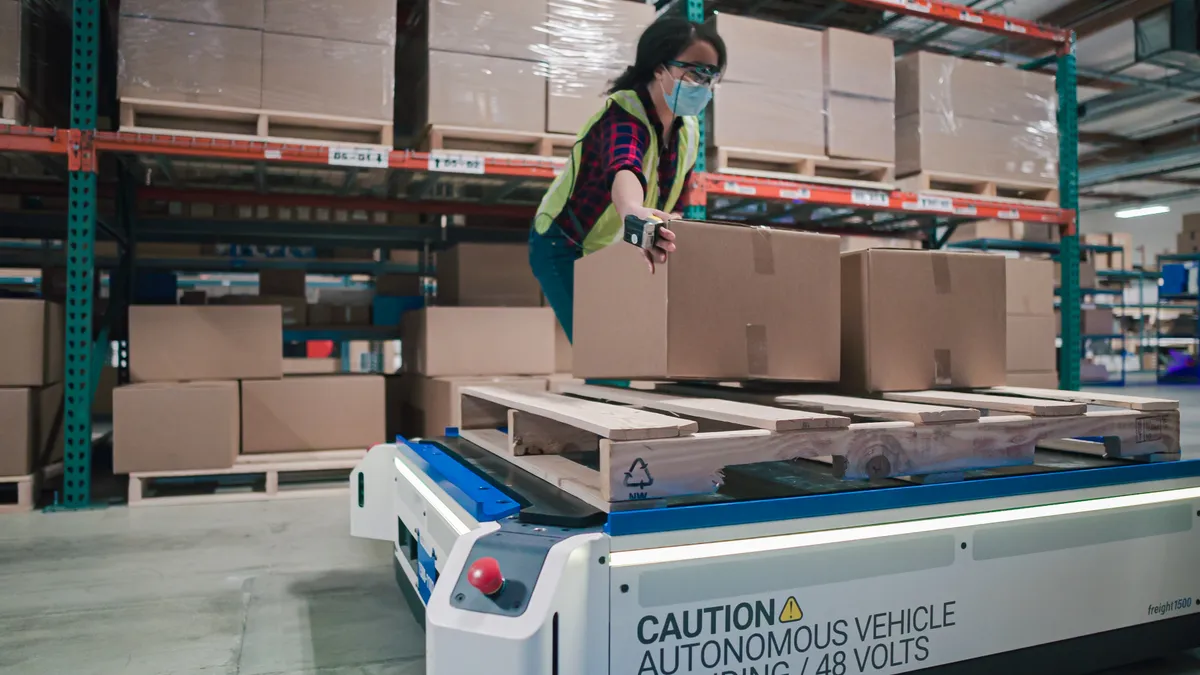Dive Brief:
- Zebra Technologies intends to acquire the remaining 95% of Fetch Robotics that it does not already own, bolstering its portfolio of technology for warehouse digitization, the company announced yesterday. Zebra will pay $290 million for the robotics company.
- Zebra had already owned part of Fetch Robotics and the two companies have already done work to integrate their respective technologies, Fetch Robotics CEO Melonee Wise said. For example, the companies developed a cloud robotics platform for moving material around a warehouse. And they have worked to use Zebra technology to scan a barcode and have that transmit a command to a robot to let it know the location of material that needs to be moved.
- Fetch provides Zebra with technology that helps increase automation and digitization of the warehouse environment by using "automated workers" or autonomous mobile robots, according to Jim Lawton, the VP and general manager of robotics automation at Zebra. Wise also noted that access to Zebra's sales relationships would "help amplify what Fetch has been doing over the last seven years."
Dive Insight:
For years there has been notable interest in warehouse robotics as Amazon, FedEx and other companies with complicated fulfillment and warehousing operations have turned to automation to increase productivity.
This interest accelerated during the pandemic because companies saw robotics as a way to make up for productivity losses associated with social distancing. As case numbers fall in the U.S., interest has remained as companies have struggled to hire workers, Lawton said.
"We talk to customers that have said to me flat out, 'I don't care if it has no ROI, I am just desperate to find an alternative, to be able to have a way to supplement the people that I have because I simply can't hire enough people,'" he said.
He and Wise acknowledged that attracting workers to low-level warehouse positions can be difficult given the job's reputation, taxing nature and lack of career path. And if companies are able to hire, that doesn't mean the workers are sticking around.
"We talked to some customers that are facing upwards of 40% turnover," Wise said.
This doesn't just drive a company's interest in automation, it also made Fetch think about who would be using its product, she said.
"With those kinds of turnover rates, you have to think about the product in a way where it has to be easy to use, easy to deploy, easy to reconfigure and deal with some of the challenges that they have in their ever changing environments," she said.
Wise said there are already "several customers" that are using Zebra technology in their warehouses to tell Fetch robots what to do.
"When you look at it, many of those customers are getting a return on investment inside of 12 months," she said, later adding that the ROI is measured through increased productivity such as upticks in units per hour or cycle time.
A good example of how the technologies are being used together is in a replenishment workflow, she said.
"The person loads a cart with the goods, and then when they're ready, they scan the appropriate barcode to say which part of the warehouse it goes to," she said. "And so then the robot comes and picks it up and takes it to that part of the warehouse dynamically."
The robots can also be set up to bring workers items they need. So if a worker scans the right barcode then a robot will bring them more tape or corrugated packaging, Wise said.
But the companies are already working to more tightly integrate their technology. This includes work with Zebra's FulfillmentEdge warehouse management software, which connects with warehouse management systems to provide pick instructions, Lawton said.















